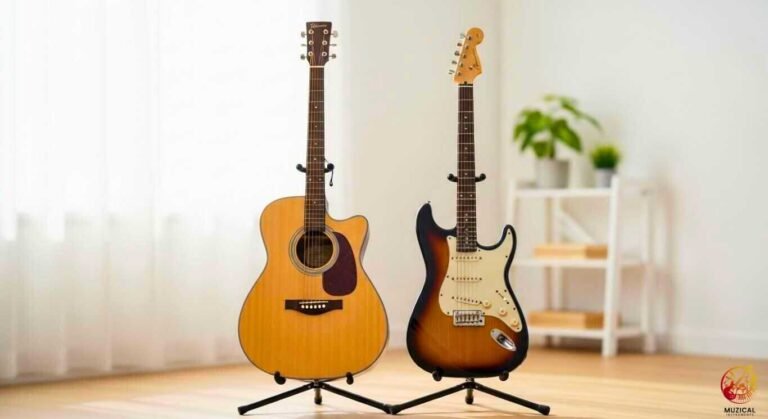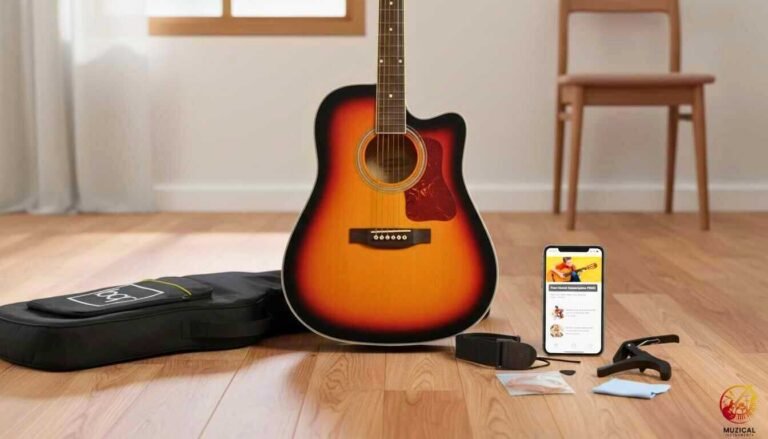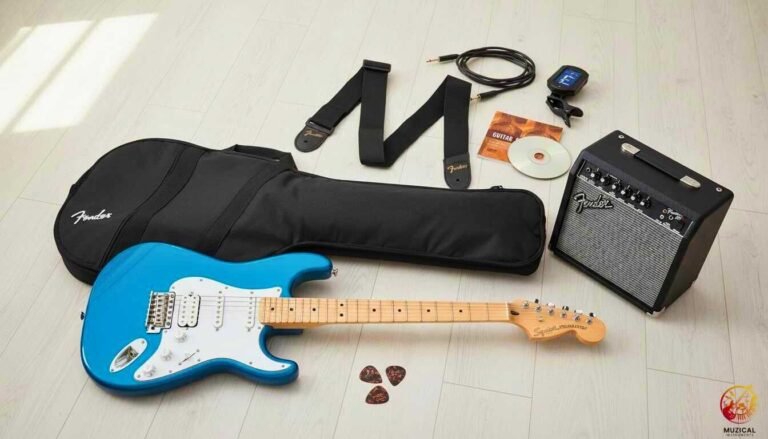Common Guitar Mistakes Every Beginner Makes (And How to Fix Them)
Common guitar mistakes can make learning harder than it needs to be. Your fingers hurt, your chords buzz, and songs never sound quite right. Most beginners don’t struggle because they lack skill, they just build bad habits early. Simple things like hand position or skipping warm ups can slow your progress a lot.
In this guide, you’ll learn the most common guitar mistakes and how to fix them fast. Once you spot them, your playing will feel smoother, cleaner, and a lot more fun.
Guitar Mistake- 1: Not Putting Your Fingers in the Right Spot
One big mistake beginners make is not pressing the strings in the right place. If your fingers are too far from the metal bar (called a fret), your guitar might make a buzzing sound. This is called fret buzz, and it can make your music sound wrong.
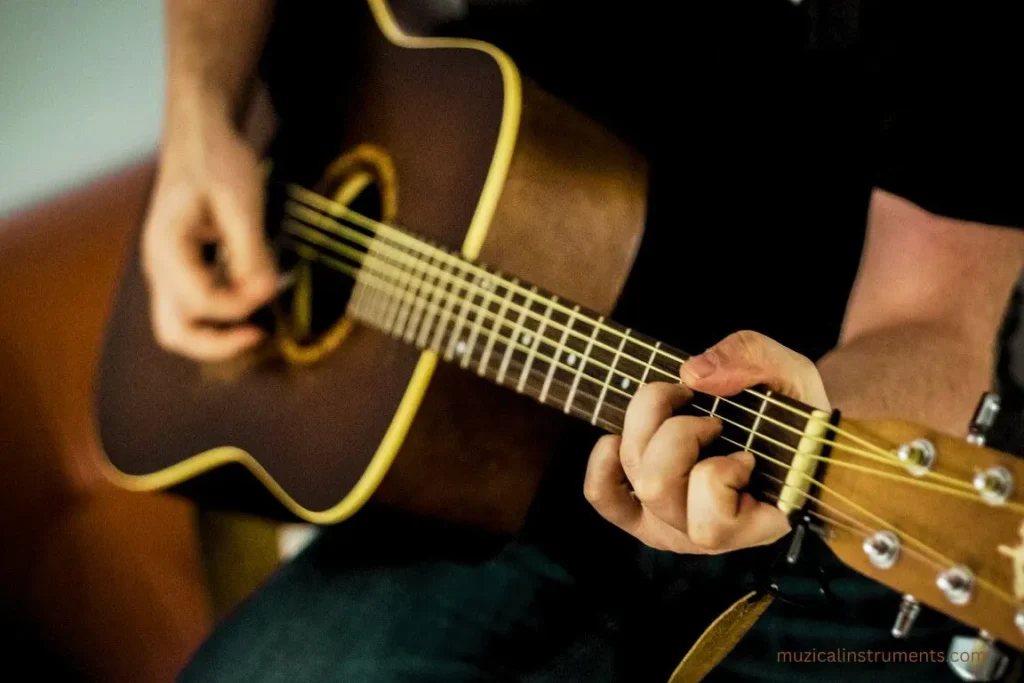
How to fix it:
Make sure your fingers press down close to the fret, but not on top of it. Press the string hard enough so it makes a clear sound. If it still buzzes, try pressing a little harder or moving your finger a bit closer to the fret.
Quick Tip:
Practice slowly. Take your time to check where your fingers are. It’s okay to go slow clear notes are more important than speed.
Guitar Mistake- 2: Sitting the Wrong Way While Playing
Many beginners sit in a way that makes it hard to play. If you hunch your back or hold the guitar too low, your hands and arms may feel tired or sore. It can also make it harder to move your fingers the right way.
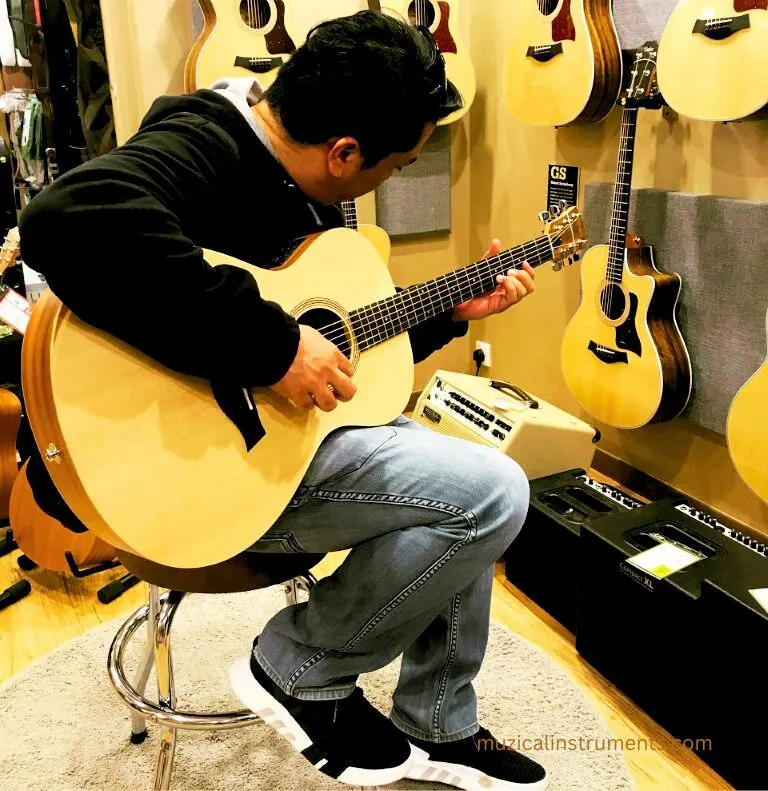
How to fix it:
Sit up straight in a chair. Rest the guitar on your leg. Hold the neck (the long part of the guitar) so it points a little bit up, not straight across. This makes it easier to see what you’re doing and play better.
Quick Tip:
Put your feet flat on the floor and try not to lean forward too much. Use a footstool or small box under your leg if the guitar slips.
Guitar Mistake- 3: Not Tuning the Guitar
If your guitar is out of tune, even the right notes will sound wrong. Many beginners forget to tune their guitar before they play. This can make it hard to tell if you are doing a good job or not.
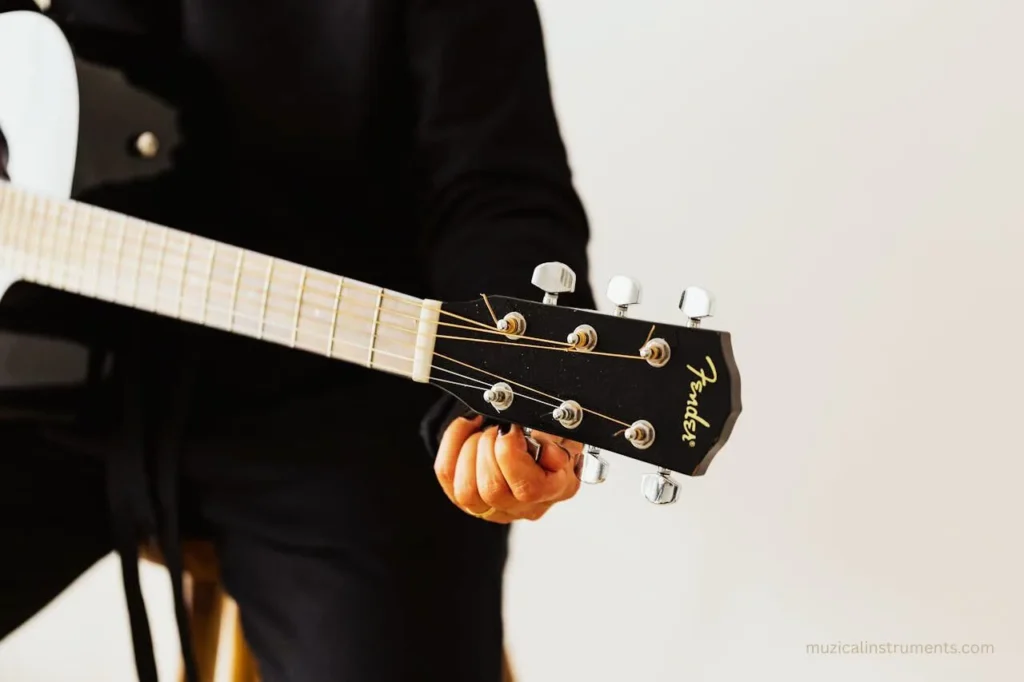
How to fix it:
Use a guitar tuner or a free tuning app on your phone. These tools help you fix each string so it sounds just right. Tuning only takes a minute, and it makes a big difference.
Quick Tip:
Tune your guitar every time before you play. Even a small change in weather or temperature can make your strings go out of tune.
Guitar Mistake- 4: Trying to Play Too Fast
Many beginners want to play songs quickly. But when you go too fast, you make more mistakes. Your fingers get mixed up, and your playing sounds messy.
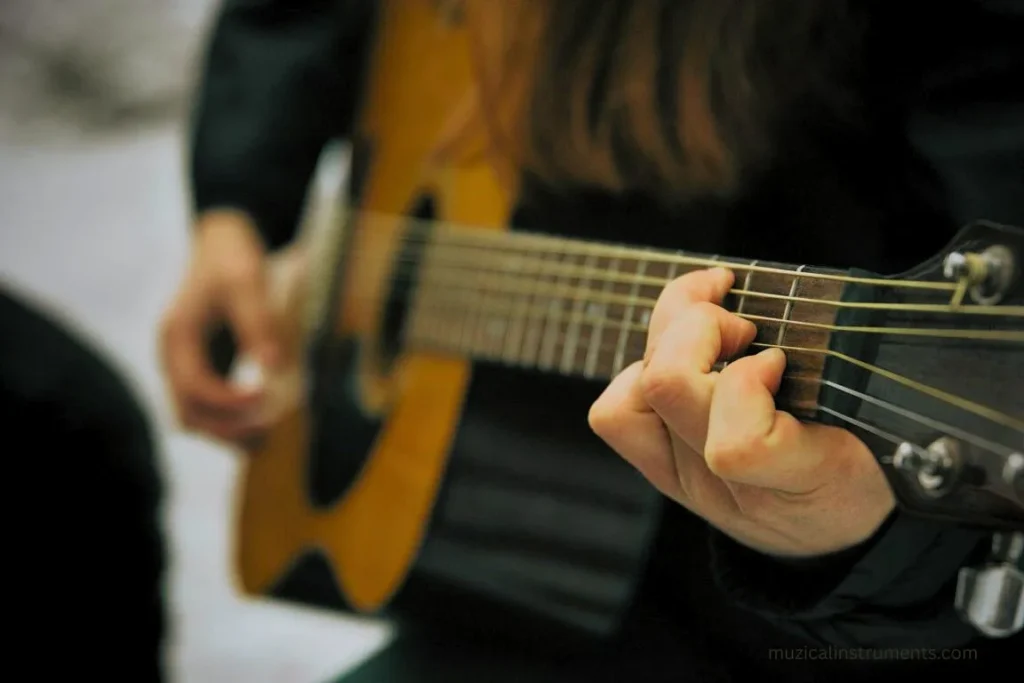
How to fix it:
Start slow. Play each chord or note one at a time. Make sure it sounds clean and clear. Once you can play it right slowly, then you can go a little faster.
Quick Tip:
Use a metronome (a tool that makes a steady clicking sound) to help you stay in time. There are free metronome apps you can try on your phone.
Guitar Mistake- 5: Skipping Warm-Up Exercises
Some beginners pick up the guitar and start playing right away. But if your fingers aren’t ready, it can be hard to move them fast or press the strings well. You might also feel pain or get tired quickly.
How to fix it:
Do a quick warm-up before you play. You can wiggle your fingers, stretch your hands, or play simple finger exercises up and down the strings.
Quick Tip:
Even just 2–3 minutes of warm-up can help your fingers feel stronger and move better.
Guitar Mistake- 6: Avoiding Hard Chords Like Barre Chords
Many beginners skip barre chords because they feel too hard. It’s true, they need more finger strength. But if you avoid them, you won’t grow as a guitar player.
How to fix it:
Start small. Try pressing down just two or three strings with one finger first. Then slowly try to press more as you get stronger. It’s okay if it doesn’t sound perfect at first, just keep practicing.
Quick Tip:
Practice barre chords for a few minutes each day. Your fingers will get stronger over time, and it will get easier.
Guitar Mistake- 7: Not Learning Music Basics
Some beginners just want to play songs and skip learning things like chords, scales, and music theory. But knowing a little bit about how music works can really help you get better faster.

How to fix it:
Start with the basics. Learn what a chord is, how a scale works, and how songs are built. You don’t need to learn everything at once, just a little at a time.
Quick Tip:
Watch short YouTube videos or use beginner apps that teach music theory in a fun and easy way.
Guitar Mistake- 8: Using the Wrong Guitar or Setup
Some beginners find their guitar hard to play, but don’t know why. The problem might be the guitar itself! If the strings are too high or the guitar is too big, it can hurt your fingers and make playing harder.
How to fix it:
Ask a music shop to check your guitar. They can help fix the string height (called the action) or suggest lighter strings. Also, make sure your guitar is the right size for you.
Quick Tip:
If your fingers hurt too much or it’s hard to press the strings, your guitar might need a setup. A small change can make a big difference.
Guitar Mistake- 9: Giving Up Too Soon
Learning guitar takes time and practice. Some beginners stop playing because they think they’re not good enough. But every good guitar player was once a beginner too!
How to fix it:
Be patient with yourself. It’s normal to make mistakes and feel stuck sometimes. Keep going, even if progress feels slow. The more you play, the better you’ll get.
Quick Tip:
Pick one small thing to practice each day. Even 10 minutes a day can help you improve. And remember—every great guitarist started just like you!
Guitar Mistake- 10: Comparing Yourself to Others
It’s easy to feel bad when you see someone else playing better or faster. But everyone learns at their own pace. Comparing yourself too much can make you want to quit.
How to fix it:
Focus on your own progress. Celebrate small wins, like learning a new chord or playing a song without stopping. Every step forward matters.
Quick Tip:
Instead of comparing, get inspired! Watch your favorite guitar players and remind yourself that they also started as beginners.
Guitar Mistake- 11: Not Listening to Yourself Critically
Many beginners don’t listen closely to their playing. This can cause you to miss small mistakes, like muted strings or wrong notes. Without hearing your own sound clearly, it’s hard to improve.
How to fix it:
Take a moment to listen carefully to what you’re playing. Play slowly and pay attention to every note and chord. If something doesn’t sound right, stop and figure out what went wrong.
Quick Tip:
Record yourself playing sometimes. Listening back will help you spot mistakes you might miss while playing.
Guitar Mistake- 12: Overlooking String Maintenance
Strings are one of the most important parts of your guitar, but beginners often forget about them. Old, dirty, or broken strings can make your guitar sound bad and be harder to play.
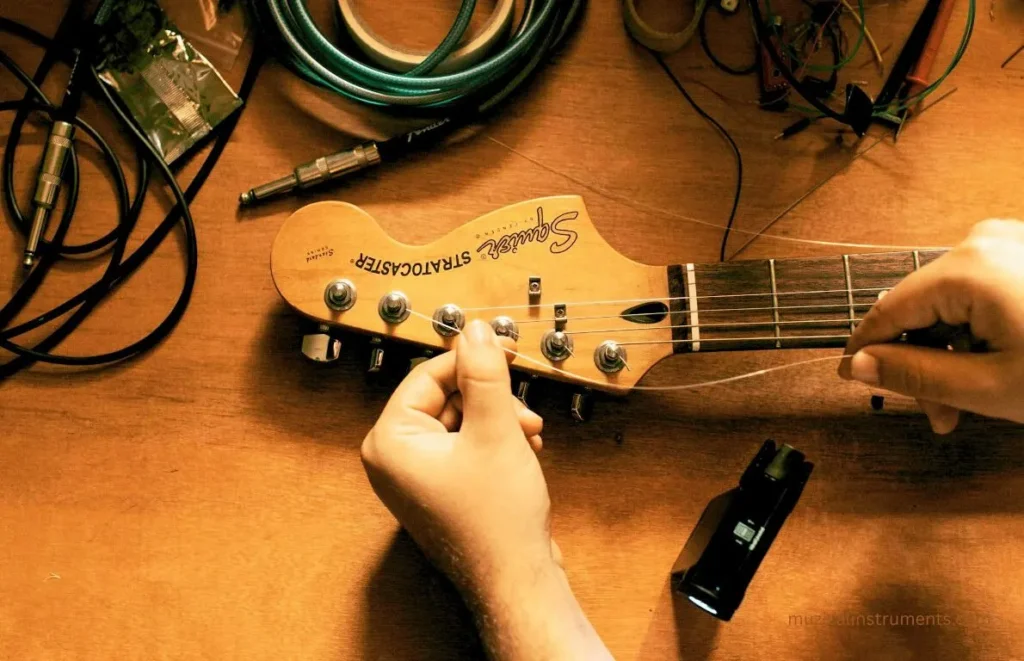
How to fix it:
Change your strings regularly, especially if they feel rough or don’t stay in tune. Clean your strings after each practice to keep them in good condition. It’s an easy way to make your guitar sound better and last longer.
Quick Tip:
If you’re unsure when to change your strings, aim for every 3 months or sooner if you play often.
Summarization of the Common Guitar Mistakes
Common Guitar Mistakes and How to Fix Them
| Mistake | How to Fix It |
|---|---|
| 1. Not Putting Your Fingers in the Right Spot | Press down close to the fret, but not on top of it. Practice slowly to ensure clean notes. |
| 2. Sitting the Wrong Way While Playing | Sit up straight, rest the guitar on your leg, and hold the neck at a slight angle. Keep your feet flat on the floor. |
| 3. Not Tuning the Guitar | Use a guitar tuner or a tuning app before every practice. Even a small tuning change can make a big difference. |
| 4. Trying to Play Too Fast | Start slow and focus on getting the notes clean. Gradually increase speed once you’re comfortable. |
| 5. Skipping Warm-Up Exercises | Do simple finger exercises or stretch your hands for 2–3 minutes before playing. |
| 6. Avoiding Hard Chords Like Barre Chords | Practice barre chords for a few minutes each day. Start small and build up finger strength over time. |
| 7. Not Learning Music Basics | Learn basic music theory, like chords, scales, and how songs are built. Use apps or short videos to make it fun. |
| 8. Using the Wrong Guitar or Setup | Get your guitar checked and set up by a professional. Make sure your guitar is the right size for you and that the strings are in good condition. |
| 9. Giving Up Too Soon | Keep practicing and be patient with yourself. Set small, daily goals and celebrate your progress, no matter how small. |
| 10. Comparing Yourself to Others | Focus on your own improvement, not others’ progress. Watch great players for inspiration, but remember they started just like you! |
| 11. Not Listening to Yourself Critically | Listen carefully while you play. Record yourself and check for mistakes. Take time to fix them before moving on. |
| 12. Overlooking String Maintenance | Change your strings regularly, clean them after each practice, and keep your guitar in good shape. Replace strings if they feel rough or won’t stay in tune. |
Hearing weird noises while playing? Learn how to fix guitar bridge buzzing before it ruins your sound.
FAQ
1. Why do my fingers hurt when I play guitar?
It’s totally normal for your fingers to hurt in the beginning! Your fingers need time to build strength, especially when pressing down on the strings. Make sure you’re using the right technique, don’t press too hard, and try to rest your fingers close to the frets. If the pain doesn’t go away after a week or so, you might want to check if your guitar needs a setup or if you need lighter strings.
2. Why does my guitar sound buzzing or out of tune?
A buzzing sound usually means you’re pressing too lightly on the strings, or your guitar’s neck may need adjustment. Also, make sure your guitar is properly tuned before you start playing. A simple tuner app can help with that. Over time, your ear will get better at recognizing when it’s out of tune, but don’t stress it takes practice!
3. How can I improve my finger placement?
Great question! Poor finger placement is one of the most common issues for beginners. To improve, focus on placing your fingers close to the fret, not on top of it. Also, try not to let your fingers “sit” on the other strings. Practice slowly at first this way, your hands can remember the right positions.
4. I want to learn songs quickly, but I feel like I’m not progressing fast enough. What should I do?
It’s tough when you’re excited to play songs but feel like you’re stuck! Remember, learning guitar takes time. Don’t rush through the steps. Focus on mastering the basics first chords, strumming, and timing before jumping into your favorite songs. Slow and steady wins the race. And hey, celebrate small wins along the way like nailing a new chord!
5. Is it okay to skip practicing scales and music theory at first?
It might be tempting to skip this, but trust me, learning a little music theory and scales will make you a better guitarist in the long run. You don’t need to dive deep into theory right away, but getting familiar with the basics will help you understand what you’re playing and why it works. Plus, it’ll make learning new songs easier!
6. How do I know when to change my guitar strings?
Strings lose their sound quality over time, and if yours feel rough or won’t stay in tune, it’s time to replace them. Generally, if you play regularly, try changing your strings every 2-3 months. If you’re hearing a dull sound or feel like the strings are too hard to press, definitely consider a change.
7. I get frustrated when my progress slows down. How do I stay motivated?
It’s totally normal to feel frustrated! Every guitarist has been there. The key is consistency. Even if you only play for 10-15 minutes a day, you’ll notice improvements over time. Set small, achievable goals like mastering a chord or strumming pattern and give yourself a pat on the back when you reach them. And don’t forget: it’s okay to take breaks when needed. The journey is just as important as the destination!
8. How can I make my practice sessions more fun?
Practice doesn’t have to feel like a chore! Mix it up by learning a new song you love, trying out different strumming patterns, or playing along with your favorite music. You could also join a community of learners online to share progress and tips it can be really motivating! The goal is to make it enjoyable, so you’ll stick with it.
Final Thought: Keep Practicing and Enjoy the Journey!
Now that you know the most common guitar mistakes beginners make, and how to fix them, you’re on your way to becoming a better player.
Learning guitar isn’t always easy. Those sore fingers, the chords that just won’t ring clean, the rhythms that trip you up. We’ve all been there. But here’s the truth nobody tells beginners: that frustration means you’re doing it right.
This isn’t about being perfect tomorrow. It’s about showing up, messing up, and getting a little better each time you pick up your guitar. That F chord will eventually obey. And one day soon, you’ll surprise yourself by playing something that used to seem impossible.
Now all you have to do is stay patient, stay focused, and most of all enjoy the journey of learning the guitar!


